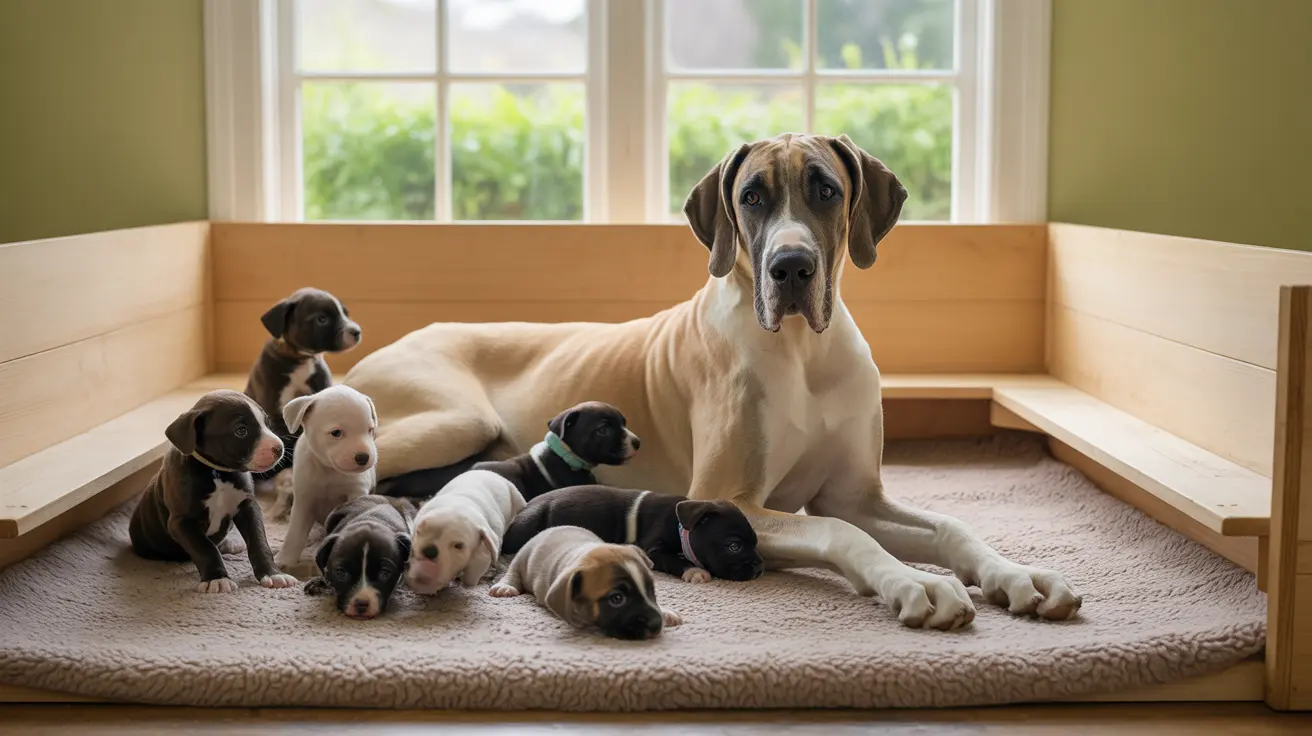Are you curious about how many puppies your Great Dane might have? As one of the largest dog breeds, Great Danes are known for producing impressive litter sizes that often surpass those of smaller breeds. Understanding what to expect during your Great Dane's pregnancy can help you prepare for the arrival of these gentle giant puppies.
In this comprehensive guide, we'll explore typical Great Dane litter sizes, factors that influence puppy numbers, and essential care considerations for expecting mothers.
Average Great Dane Litter Size
Great Danes typically deliver larger-than-average litters, with most mothers producing between 8 and 10 puppies per pregnancy. However, this range can extend from 5 to 13 puppies, depending on various factors. Some exceptional cases have even recorded up to 19 puppies in a single litter, though such large numbers are rare.
Compared to the average dog litter size of 5-6 puppies, Great Danes consistently produce more offspring, reflecting their status as a giant breed.
Key Factors Affecting Litter Size
Age and Health of the Mother
The mother's age significantly impacts litter size, with females between 2-5 years typically producing the largest litters. First-time mothers or those over 5 years old generally have smaller litters. The dam's overall health and nutrition status also play crucial roles in determining puppy numbers.
Genetic Influences
Genetics account for approximately 15% of litter size determination. Purebred Great Danes with diverse genetic backgrounds tend to have larger litters compared to those with more limited genetic diversity. Certain coat colors, such as harlequin, may be associated with slightly smaller litter sizes.
Pregnancy and Whelping Process
Great Dane pregnancies last approximately 63 days, during which proper veterinary care is essential. Due to their large size and potentially sizeable litters, these dogs may require special attention during pregnancy and whelping.
Pre-Whelping Preparation
- Set up a spacious whelping box
- Schedule regular veterinary check-ups
- Provide appropriate nutrition for the expecting mother
- Monitor for any pregnancy complications
Special Care Requirements
Large litters demand extensive care and resources. The mother may need assistance with feeding all puppies, and some might require supplemental nutrition. Monitoring each puppy's growth and development becomes crucial, especially in litters exceeding 8 puppies.
Nutritional Needs
Great Dane mothers nursing large litters require significantly increased caloric intake and specific nutrients to maintain their health while feeding their puppies. High-quality puppy food or performance dog food is often recommended during lactation.
Frequently Asked Questions
What is the average litter size for a Great Dane?
Great Danes typically have 8-10 puppies per litter, though this can range from 5-13 puppies in normal circumstances.
What factors influence the number of puppies in a Great Dane litter?
Key factors include the mother's age and health, genetic background, nutrition status, and overall breeding conditions. Prime breeding age (2-5 years) typically yields larger litters.
How long is the pregnancy (gestation period) for a Great Dane?
The gestation period for Great Danes is approximately 63 days, or about nine weeks, which is standard for all dog breeds.
What special care does a Great Dane mother need during and after whelping a large litter?
Great Dane mothers require increased nutrition, regular veterinary check-ups, a spacious whelping area, and possible assistance with feeding large litters. Post-whelping monitoring for both mother and puppies is essential.
How does the Great Dane litter size compare to other large dog breeds?
Great Danes typically have larger litters than most breeds, including other large dogs. While breeds like German Shepherds average 6-10 puppies, Great Danes commonly produce 8-13 puppies per litter.
Understanding Great Dane litter sizes helps breeders and owners prepare for successful pregnancies and healthy puppies. While large litters are common for this breed, each pregnancy is unique and requires individual attention and care to ensure the best outcomes for both mother and puppies.






